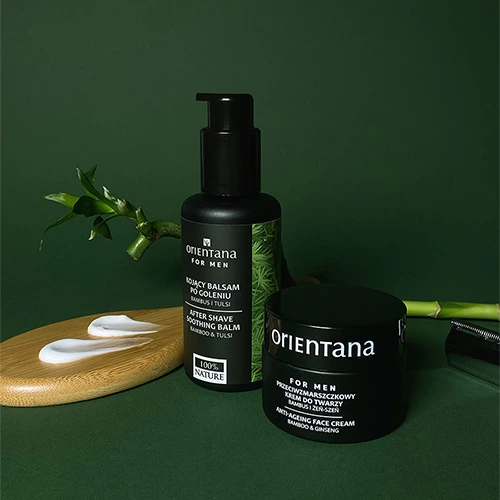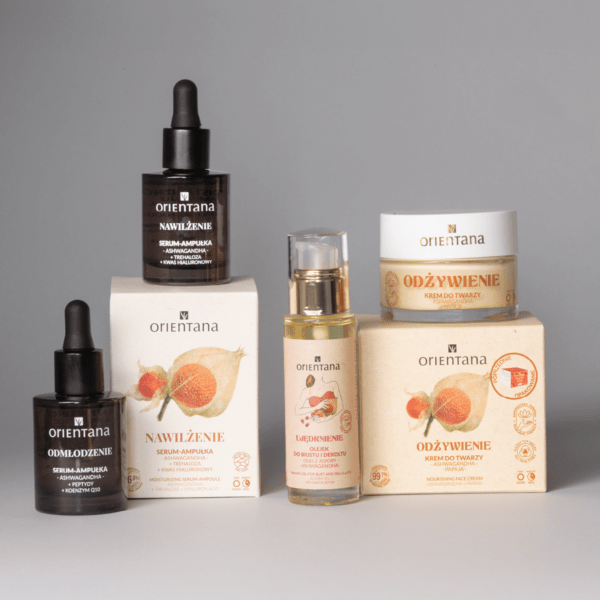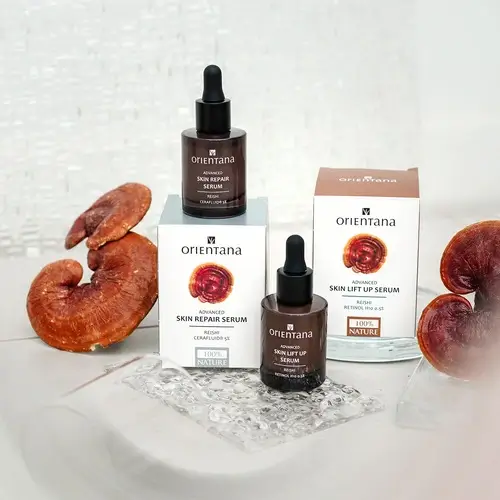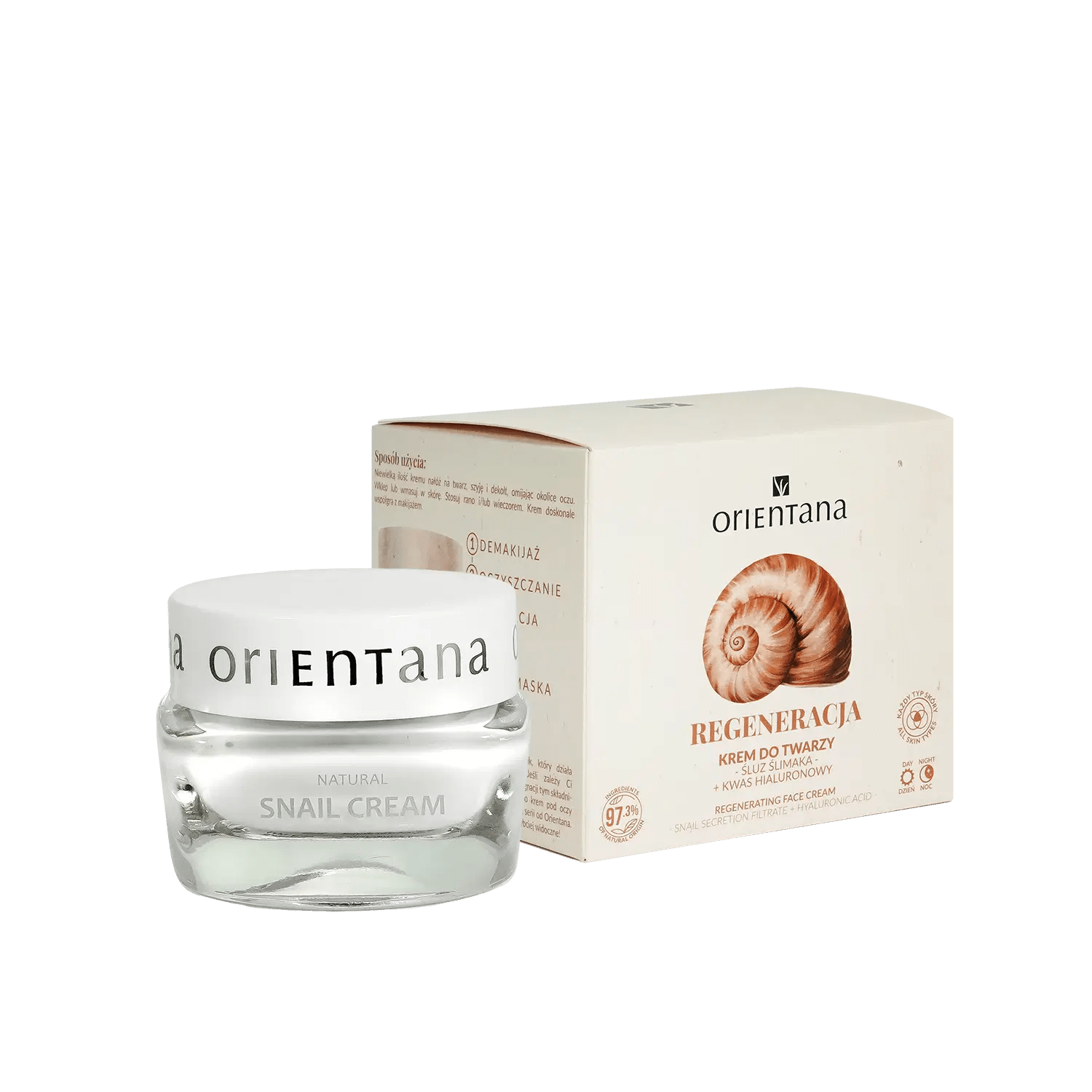Modern cosmetology increasingly draws on the achievements of natural medicine and phytotherapy. One of the most promising areas of research is adaptogens.
In the context of skin care, adaptogens have gained importance as ingredients that reduce the effects of oxidative and inflammatory stress , prevent premature aging and support the natural protective barrier of the epidermis.
What are adaptogens?
Adaptogens are active substances isolated from plants that have the ability to modulate the body's response to stress and restore homeostasis. The term was first coined by N.V. Lazarev in the 1940s. According to the WHO definition, an adaptogen must meet three criteria: demonstrate a nonspecific normalizing effect, be nontoxic, and enhance resistance to physical, chemical, and biological stress (Panossian & Wikman, 2010).
The name adaptogen comes from the Latin word adaptare , meaning "to adapt," and the Greek suffix -gen , meaning "causing" or "inducing." The term was introduced in the mid-20th century by Soviet toxicologist and pharmacologist Nikolai Lazarev.
In 1947, Lazarev proposed the term "adaptogen" to describe substances that increase the body's nonspecific resistance to stress and help restore homeostasis, regardless of the type of stressor (physical, chemical, or biological). His research was later continued by his students, particularly Israel Brekhman and Ilya Dardymov, who further refined the criteria for adaptogens.
The effect of adaptogens on the skin
How do adaptogens support the skin?
Adaptogens have long been known for their impact on overall well-being, but in recent years, their potential in skin care has been increasingly recognized. Rich in antioxidants , saponins, triterpenes, and polysaccharides , adaptogenic plants offer comprehensive support for sensitive, stressed, and prematurely aging skin.
Reduction of inflammation and redness
Adaptogens have anti-inflammatory effects at the cellular level. Studies have shown that substances such as withanolides (ashwagandha) and salidroside (rhodiola rosea) inhibit the expression of proinflammatory cytokines, including IL-1β, IL-6, and TNF-α.
In vitro models have shown that Ganoderma lucidum (Reishi) extract reduces TNF-α levels by over 35% in skin cells exposed to UV radiation (Wachtel-Galor, 2011). Gotu kola, in turn, inhibits the activity of COX-2, an enzyme responsible for inflammation and swelling.
For the skin, this means a reduction in redness , tightness and reactivity to external factors, especially in people with atopic dermatitis, rosacea and hypersensitivity.
Cell protection against free radicals
One of the biggest threats to the skin are reactive oxygen species (ROS), which destroy cellular structures, accelerating the aging process . Adaptogens are a rich source of compounds with strong antioxidant properties – such as ginsenosides, flavonoids, betulin, and polysaccharides.
A study by Lee et al. (2019) showed that ginseng extract reduced lipid peroxidation levels by 42% and simultaneously increased the activity of antioxidant enzymes (SOD, catalase) in keratinocytes.
The result? Less damage to DNA and structural proteins, better protection against UV radiation and air pollution.
Strengthening the hydrolipid barrier
The hydrolipid barrier is the skin's first line of defense. Its weakening leads to increased water loss (TEWL) , dryness, hyperreactivity, and susceptibility to allergens.
Adaptogens such as Reishi, Gotu Kola and Tulsi:
- Increases the expression of ceramides and epidermal lipids (Panossian, 2010)
- Reduce TEWL by up to 25% within 14 days (Donovan et al. study, 2021)
- They support the regeneration of the stratum corneum of the epidermis
The skin becomes more resistant to external factors , is better moisturized, and less susceptible to peeling and irritation.
Stimulation of collagen and elastin synthesis
With age, fibroblast activity declines, leading to loss of firmness and the appearance of wrinkles. Adaptogens counteract this phenomenon by increasing the production of type I and III collagen and stimulating the activity of TGF-β – a growth factor responsible for skin regeneration.
In a 2021 study (Donovan et al.), oral adaptogen supplementation increased skin elasticity by 12% and hydration by 16% after just 8 weeks of use.
The action of adaptogens translates into improving the skin's structure , smoothing wrinkles and restoring a youthful appearance.
Supports the regeneration of sensitive and tired skin
Adaptogens support repair and regenerative processes . They accelerate wound healing, stimulate keratinocyte migration, and reduce cellular stress.
Gotu kola, thanks to the content of madecassoside and asiaticoside:
- increases fibroblast proliferation by 30–50%
- accelerates wound closure by 40% faster compared to placebo (in vivo studies)
In turn, rhodiola and reishi improve microcirculation, which results in better tissue oxygenation and faster regeneration of tired, gray and dull skin.
The skin becomes more resistant, regenerated and radiant, especially after exposure to the sun, pollution or stress.
Adaptogens are extremely effective yet safe active ingredients that provide comprehensive skin support. Their anti-inflammatory , antioxidant, and regenerative properties make them ideal for sensitive skin prone to oxidative stress and premature aging.
Regular use of cosmetics with adaptogens can bring visible improvement in skin condition within a few weeks – in terms of hydration, elasticity and reduction of irritation.
Adaptogens in natural cosmetics act as biological shields: they protect, strengthen and regulate.
The most popular adaptogens used in cosmetics
Ashwagandha (Withania somnifera)
Ashwagandha is a plant that has been used in Ayurvedic medicine for centuries. It contains withanolides, alkaloids, and flavonoids, which exhibit potent antioxidant, anti-inflammatory, and immunomodulatory effects. In vitro studies have shown that ashwagandha extracts improve fibroblast proliferation and accelerate the regeneration of damaged epidermis (Mishra et al., 2000).
It's a powerful antioxidant that protects the skin from oxidative stress. It supports regeneration and strengthens the barrier function of the epidermis.
Check out: ASHWAGANDHA Facial Serum-Ampoule

Adaptogenic care for skin prone to stress. Contains ashwagandha root extract, which has anti-inflammatory and antioxidant properties and supports the skin's protective barrier.
Rhodiola rosea
Native to cold regions of Europe and Asia, it contains rosavin and salidroside, which stabilize cortisol levels and protect cells from oxidative stress. In a dermatological context, it has the ability to improve cellular metabolism and protect against UV radiation, as confirmed by a study conducted by De Sanctis et al. (2012).
It stabilizes cortisol levels, protects cellular DNA, supports skin metabolism and protects against UV radiation.
Check out the REISHI and RHODIUM ROOT Illuminating Booster (for day use)

– Brightens and energizes the complexion. Rhodiola helps combat oxidative stress and skin fatigue.
Reishi (Ganoderma lucidum)
This mushroom has a long tradition of use in Chinese medicine. Rich in polysaccharides, triterpenoids, and peptides, Reishi exhibits anti-inflammatory, immunostimulating, and antioxidant properties. In skin care, it promotes healing, reduces redness, and protects against external factors (Wachtel-Galor et al., 2011).
An adaptogenic mushroom rich in polysaccharides. It has anti-inflammatory properties, improves hydration, and promotes the regeneration of sensitive skin.
Check out the entire Reishi series.
Tulsi (Ocimum sanctum)
Also known as holy basil, it contains eugenol, ursolic acid, and anthocyanins. It has proven antibacterial, antifungal, and anti-inflammatory properties. Tulsi extracts reduce sebum secretion, support acne treatment, and protect skin cells from oxidative stress (Mondal et al., 2009).
It has antibacterial and anti-acne properties. It reduces sebum production and soothes skin stress.
Check out Neem and Tulsi Shaving Balm
– Tulsi has antibacterial and soothing properties. Ideal for skin prone to razor burn.
Ginseng (Panax ginseng)
It contains ginsenosides, which improve microcirculation, support cell renewal, and stimulate collagen synthesis. Studies have shown that ginseng can counteract discoloration and increase skin elasticity, making it firmer and more radiant (Shin et al., 2017). It improves microcirculation, supports collagen synthesis, and helps reduce discoloration.
Check out: Anti-wrinkle cream for men. 
Gotu Kola (Asian pennywort)
Gotu kola (Centella asiatica) is an adaptogenic plant with multifaceted biological effects, valued in both traditional medicine and modern cosmetology. In the context of hair care, its effects stem primarily from the presence of triterpenes (such as asiaticoside and madecassoside) and flavonoids.
Gotu kola improves microcirculation in the scalp, facilitating oxygenation and nourishment of hair follicles. This helps activate the anagen (hair growth) phase, which may help prevent excessive hair loss and stimulate hair growth.
Centella asiatica extract has anti-inflammatory and antioxidant properties, which helps reduce scalp irritation and supports epidermis regeneration, especially in cases of inflammation or dandruff.
Hair cosmetics: e.g. Ayurvedic hair lotion or Ayurvedic Therapy
– They strengthen hair follicles, stimulate hair growth and improve microcirculation in the scalp.
Adaptogens and oxidative stress of the skin
Oxidative stress is one of the main enemies of healthy skin. It causes collagen degradation, increased transepidermal water loss (TEWL), wrinkles, discoloration, and irritation.
Adaptogens counteract these processes by neutralizing free radicals (ROS), inhibiting inflammation and supporting the natural renewal of the epidermis.
Effects of oxidative stress:
- Degradation of collagen and elastin
- Discoloration (sun spots, melasma)
- Inflammatory conditions (acne, atopic dermatitis, psoriasis)
- Loss of firmness and dryness of the skin
The skin, as an organ in direct contact with the external environment, is particularly vulnerable to the effects of stress. Both physical and mental stress lead to overproduction of cortisol, which disrupts the epidermal barrier and exacerbates inflammatory processes. Chronic oxidative stress results in the accumulation of free radicals, which leads to damage to cellular structures, including lipid membranes, proteins, and DNA, contributing to premature skin aging (Pillai et al., 2005).
Oxidative stress plays a key role in the skin aging process and in the development of many dermatological conditions . It occurs when the balance between the production of reactive oxygen species (ROS) and the body's ability to neutralize them through antioxidant systems is disturbed.
Oxidative stress leads to the excessive production of reactive oxygen species (ROS), which damage essential cellular structures such as lipid membranes, proteins, and DNA. In the skin, this results in the degradation of collagen and elastin —the main proteins responsible for skin firmness, elasticity, and youthful appearance. Over time, this leads to a loss of elasticity, wrinkle formation, and skin laxity. This process is one of the main mechanisms of skin aging, both endogenous (intrinsic) and exogenous, such as exposure to UV radiation.
Oxidative stress negatively impacts skin cell proliferation and differentiation, resulting in slower epidermal renewal and impaired wound healing. Weakened cells have a reduced ability to repair damage, which can lead to chronic inflammation, infections, and permanent structural changes in the skin.
Who are adaptogen cosmetics recommended for?
Natural cosmetics with adaptogens are not just a passing trend, but a well-thought-out solution for people whose skin is subjected to daily challenges – stress, pollution, hormonal changes, and sleep deprivation. Thanks to their ability to restore balance, reduce inflammation, and strengthen the epidermal barrier, adaptogens are effective in the care of many skin types and various physiological skin conditions.
For people living in constant stress and pace
Daily pressures, lack of sleep, a sedentary lifestyle, and exposure to blue light (HEV) all contribute to excess cortisol production and oxidative stress. Skin becomes dull, gray, and dehydrated, and its protective barrier weakens.
Adaptogens such as ashwagandha, rhodiola rosea and reishi help neutralize the effects of environmental stress , support microcirculation and restore freshness and balance to the skin.
For people with sensitive, reactive and dehydrated skin
Sensitive skin requires special care – it is easily irritated and reacts to temperature changes, tap water, cosmetics containing alcohol, and SLS. It is also often accompanied by increased transepidermal water loss (TEWL) and redness.
Adaptogens such as reishi and ginseng have soothing and strengthening properties , improving the skin's resistance to external factors. Gotu kola, on the other hand, supports epidermal regeneration and the restoration of the hydrolipid barrier.
For people with signs of premature aging
Wrinkles, loss of firmness, discoloration or a gray complexion are symptoms that can appear even before the age of 30, especially in people exposed to stress, smog and lack of sleep.
Research shows that regular use of cosmetics with adaptogens can:
- increase collagen synthesis by 21–35% (in the case of ginseng and ashwagandha)
- improve skin elasticity by more than 12% after 8 weeks of supplementation (Donovan et al., 2021)
- reduce redness and signs of fatigue after just 14 days of using Reishi products
Adaptogens are therefore a natural alternative for people looking for effective anti-aging care without retinoids or AHA/BHA acids .
For people with dermatological problems
Acne vulgaris, rosacea, atopic dermatitis (AD), erythema or eczema – these are conditions in which the skin is in a state of chronic inflammation and weakening.
Adaptogens, thanks to their ability to inhibit proinflammatory cytokines (IL-6, TNF-α) and support healing and regeneration processes, can be a valuable adjunct therapy. Gotu kola and tulsi are known for their anti-inflammatory and soothing effects. Ashwagandha and reishi help reduce skin hyperreactivity and repair microdamage.
For anyone who wants to protect their skin from environmental stress
Air pollution, smog, UV and HEV radiation, air conditioning – all these factors have a proven impact on collagen degradation, melanogenesis disorders and the weakening of the skin's protective layer.
Adaptogens are a natural “biological shield” that:
- neutralizes free radicals,
- regulates the inflammatory response,
- supports detoxification and skin repair.
Adaptogens in supplements – support from the inside
Adaptogens can also be taken orally – in the form of capsules, extracts, or teas. They then act systemically:
- stabilizing cortisol levels
- strengthening immunity
- improving sleep, mood and concentration
Supplements with adaptogens often combine, for example, ashwagandha, rhodiola rosea, and ginseng – for a synergistic effect.
Adaptogens are innovative ingredients with proven antioxidant and anti-inflammatory effects. They reduce the effects of stress on the skin, support its regeneration, and delay the aging process. Their effectiveness has been confirmed by numerous scientific studies.
If you are looking for natural support for your skin, cosmetics with adaptogens are a safe, effective and modern choice.
See also
👉 [link to the category Antioxidation - 6 adaptogens
👉 [link to the entry: Reishi Mushroom - Treasure of Eastern Medicine
👉 [link to the post: Ashwagandha - action on skin stress








